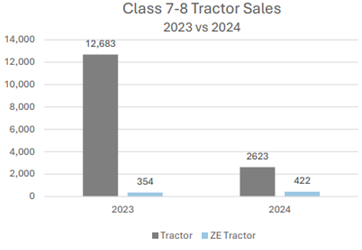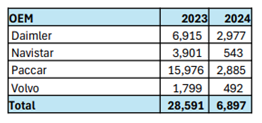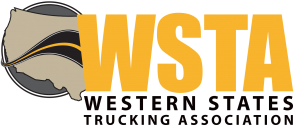The trucking industry at large breathed a sigh of relief to hear that CARB withdrew its federal application to implement the Advanced Clean Fleets (ACF) Regulation on January 13, 2025. The outgoing Biden Administration answered the following day that they considered the matter closed, indicating a desire to leave little opportunity for the next administration to take up action on the matter. This month I look into the reasons for the ACF withdrawal, explain why WSTA continues to fight for justice, and summarize several key programs yet to be affected by the change in Washington DC.
Why did CARB blink? CARB approved the ACF in April 2023 and submitted the required application to the US Environmental Protection Agency (EPA) in November 2023. The federal Clean Air Act allows California to apply for a “waiver” of federal requirements in order for California to enforce emissions standards more stringent than federal law. According to former CARB Chair Mary Nichols the CARB decision to withdrawal the ACF application was influenced by legal authority concerns and an incoming Trump Administration that is hostile to CARB’s actions.
Portions of ACF remain: The CARB withdrawal does not mean that ACF is dead and buried, however, as it stands as an official California state regulation until further notice and the “State and Local Government” portion of the Regulation will be enforced according to CARB. At a minimum, this means that WSTA members as residents and ratepayers will face rate hikes for electricity, water and sanitation services. All public agencies in the state, regardless of size, must procure only zero emissions vehicles in 2027 and beyond. Due to the known high upfront costs and dwindling state budget funding to fund incentives one can reasonably predict that increased rates will be needed. As an example, one Central Valley city estimated a $20 million price tag to convert its refuse collection fleet to ZEVs and the City has no solid funding plan to deal with CARB’s ACF mandate.
A second consideration is the likely effect on public works contracting. Many WSTA members derive revenue from public works projects ranging from pothole repair, local road and sewer projects to major critical infrastructure projects. When ACF affected agencies (who are currently left twisting in the wind by a broke Sacramento) must redirect it limited capital resources to ZEVs one can predict that public works projects will be delayed, downsized or dropped. Finally, there are reporting deadlines and requirements for drayage, “high priority,” and federal fleets for which the enforceability must be resolved. As of this writing, CARB has not revealed is next moves or whether it will try to replace ACF with some other regulatory scheme in the near future. Some observers suggest that CARB may time another ACF in anticipation of a more friendly post-Trump in 2028 or beyond. Due to the remaining uncertainty in how these portions of ACF will affect WSTA members, there have been no compelling reasons to drop the active litigation against CARB at this point.
Summary of WSTA Litigation: Western States Trucking Association vs. Steven Cliff (CARB Executive Officer) was filed on July 21, 2023 in Fresno County Superior Court.
The suit requests a temporary and permanent injunction that would halt the implementation of the Advanced Clean Fleets (ACF). The causes of action relate to 1) inadequate CEQA analysis; 2) improper cost analysis; 3) lack of scientific review; 4) procedural violations by removing documents from the public record; and 5) a post-Regulation notice that affects how WSTA members could be roped into buying electric trucks even if they are below 50 trucks or $50 million in gross receipts annually. CARB retracted its notice in October 2024, but the remaining four issues remain. There have been extensive negotiations to resolve these issues outside of Court however this has not been successful to protect WSTA’s interests.
Four separate federal actions have been filed in Washington DC during 2023-2024. These relate to EPA waivers that allow CARB to enforce electric truck manufacturing mandates (“ACT”), Emissions Warranty and Airport Shuttle Bus operator requirements to buy only ZEVs, federal Tailpipe Standards and Greenhouse Gas vehicle standards. These actions have been slowly moving through the federal court system.
Summary of Endangerment Finding: In 2009 the EPA determined that greenhouse gases endanger human health and welfare. In response to President Trump’s executive orders on his first day, on February 26, 2025, “[t]hree people granted anonymity to discuss the action said EPA Administrator Lee Zeldin has recommended to the White House that the agency overhaul the finding, which underpins all Clean Air Act climate regulations.” Should the Trump Administration remove or modify the finding there could be additional legal authority problems with EPA waivers already granted or future EPA waivers sought by CARB.
Key CARB regulations remain: Neither the Omnibus Low N0x, Advanced Clean Trucks (ACT) nor the Clean Truck Check (CTC) are impacted by the recent CARB ACF withdrawal. Omnibus and ACT are playing out negatively for small to large truck purchasers. Most truck dealers are told by their OEMs that they must sell ZEVs in order to sell diesel or natural gas trucks. So, the customer is told that in order to buy a new CARB-certified engine for use in California that they must buy a ZEV for each three to ten internal combustion engines they buy, or they cannot do the transaction. Unless or until the OEMs rework their “Clean Truck Partnership” agreement on Omnibus and ACT with CARB this situation is expected to continue. Work arounds such as purchasing trucks outside of California then importing later may be uncertain as well. On the CTC front, CARB’s “VIS” database continues to be a challenge with paying the new annual emissions fee of $31.18 per truck and then implementing the confusing twice per year testing schedule for 2025 and 2026. Expect four times per year testing in 2027.
Why we fight: CARB’s ACF withdrawal, while a welcome delay, does not resolve WSTA’s concerns about CARB. There is nothing to say that CARB will not simply wait a year or two and time a new ACF to coincide with the January 2029 exit of Donald Trump. Legal challenges to CARB’s zero emission vehicle mandates are moving closer to the courtroom. Since the COVID-era push to outlaw internal combustion of petroleum fuels, WSTA has participated in the federal and state legal proceedings in which CARB passed several zero emission mandates and the prior EPA rubber stamped them. WSTA should view the legal challenges as the opportunity to cut the head off the snake that has been biting you for decades by restricting CARB’s state and federal authority in a lasting way through victory in the courtroom.
WSTA has joined a coalition of like-minded associations and companies in petitioning the US Ninth Circuit Court of Appeals for judicial review of the CARB Omnibus Regulation approval given by the United States Environmental Protection Agency (EPA). Our filing follows EPA’s action in December by the outgoing Administrator to allow CARB to enforce the tighter truck engine emissions standards from 2024 onwards. The Petitioners are asking the Court to find EPA’s decision unlawful and remove the EPA approval, rendering the Omnibus Regulation invalid.
WSTA Sues Over Low NOx Waiver
CARB’s Regulation was adopted in 2020 and established a reduction of oxides of nitrogen (N0x) by over 80% between the 2024 and 2027 engine model years. The most recent estimates of the cost impact that I have heard is that new engines this year will cost between $10,000 and $25,0000 each. Many engine manufacturers have removed popular engine models from the available line up and there are caps on the amount of CARB-certified and those that are not CARB-certified. To further complicate matters, the sales of internal combustion engines in trucks >8,500 lbs. GVWR is also tied to the number of zero emission trucks sold. In light of the low customer demand and the withdrawal of the CARB Advanced Clean Fleets (ACF) the sales of new internal combustion trucks have plummeted due to CARB’s regulatory house of cards. More stringent engine standards are not working to bring new engines into California due to CARB’s failure to fix foreseeable problems that WSTA and other warned them about.
The timeline to hear the petition is not clear at this time. The Petition was also filed on behalf of the California Asphalt Pavement Association, California Fuels and Convenience Alliance, Associated General Contractors of New York, the New York Construction Materials Association and HR Ewell Inc, a privately held trucking company in Pennsylvania. Stay tuned to WTN as this story unfolds.
Questions may be addressed to Sean@CleanFleets.net or (916) 718-7050.





